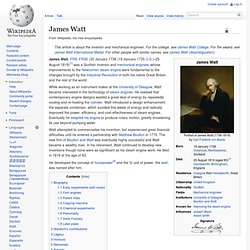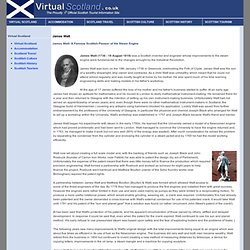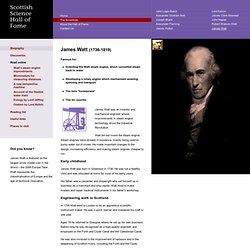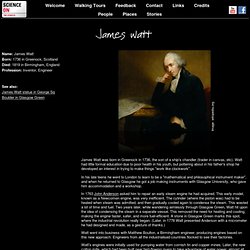

James Watt. James Watt, FRS, FRSE (30 January 1736 (19 January 1735 O.S.)–25 August 1819)[1] was a Scottish inventor and mechanical engineer whose improvements to the Newcomen steam engine were fundamental to the changes brought by the Industrial Revolution in both his native Great Britain and the rest of the world.

Watt attempted to commercialise his invention, but experienced great financial difficulties until he entered a partnership with Matthew Boulton in 1775. The new firm of Boulton and Watt was eventually highly successful and Watt became a wealthy man. In his retirement, Watt continued to develop new inventions though none were as significant as his steam engine work. He died in 1819 at the age of 83. He developed the concept of horsepower[2] and the SI unit of power, the watt, was named after him. Biography In 1764, Watt married his cousin Margaret (Peggy) Miller, with whom he had five children, two of whom lived to adulthood: James Jr. (1769–1848) and Margaret (1767–1796). First engines. James Watt. James Watt (1736 - 19 August 1819) was a Scottish inventor and engineer whose improvements to the steam engine were fundamental to the changes wrought by the Industrial Revolution.

James Watt was born on the 19th January 1736 in Greenock, overlooking the Firth of Clyde. James Watt was the son of a wealthy shipwright, ship owner and contractor. As a child Watt was unhealthy which meant that he could not attend school regularly and was mostly taught at home by his mother. He also spent much of his time learning engineering skills and making models in his father's workshop. At the age of 17 James suffered the loss of his mother and his father's business started to suffer. James Watt began his experiments with steam in the early 1760s. Watt now set about creating a full scale model and, with the backing of friends such as Joseph Black and John Roebuck (founder of Carron Iron Works, near Falkirk) he was able to patent the design (by act of Parliament).
James Watt biography - Science Hall of Fame. Famous for: Inventing the Watt steam engine, which converted steam back to water Developing a rotary engine which mechanised weaving, spinning and transport The term 'horsepower' The rev counter.

James Watt was an inventor and mechanical engineer whose improvements in steam engine technology drove the Industrial Revolution. Watt did not invent the steam engine. Steam engines were already in existence, mainly being used to pump water out of mines. He made important changes to the design, increasing efficiency and making steam engines cheaper to run. Early childhood. History - James Watt. James Watt - Scottish Enlightenment. Our cookie usage We use cookies to ensure that we give you the best experience on our website.

If you continue to use this website, we'll assume that you are happy to receive these cookies. Find out more about how we use cookies. Find us on Privacy and cookies Scotlands History\|Scottish Enlightenment James Watt James Watt, scientist and engineer (1736 - 1819) Content Play Controls Transcript Download Related Links This video has an actor portraying Scottish inventor and mechanical engineer James Watt talking about his work to make steam engines more powerful and reliable - achievements which underpinned the Industrial Revolution.
Learn more about James Watt Watt’s experience as a maker and repairer of scientific apparatus combined with his keen intellectual and technical know-how led him to the crucial refinements of steam engine technology which expanded its potential uses. Explore our websites Search for a school More search options Visit Scottish Schools Online. James Watt. James Watt was born in Greenock in 1736, the son of a ship's chandler (trader in canvas, etc).

Watt had little formal education due to poor health in his youth, but pottering about in his father's shop he developed an interest in trying to make things "work like clockwork". In his late teens he went to London to learn to be a "mathematical and philosophical instrument maker", and when he returned to Glasgow he got a job making instruments with Glasgow University, who gave him accommodation and a workshop.
In 1763 John Anderson asked him to repair an early steam engine he had acquired. This early model, known as a Newcomen engine, was very inefficient. The cylinder (where the piston was) had to be heated when steam was admitted, and then gradually cooled again to condense the steam. Watt went into business with Matthew Boulton, a Birmingham engineer, producing engines based on this new approach. Watt's engines were initially used for pumping water from cornish tin and copper mines. James Watt & Propeller.